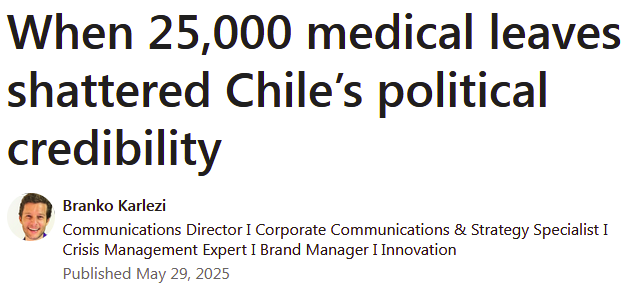Bump.
We probably won’t see the end of the reporting on this abuse for a while, which is a good thing: reporting on a bad thing. Chile is actually confronting or at least acknowledging the massive levels of corruption, fraud, and abuse that for so long so many have wanted to pretend didn’t exist – including the risible notion that the Pacos were somehow squeaky clean. Will it mean any sort of real change in the profoundly dishonest nature of the prevailing culture of the country? Nah. Just periodic mention that it’s still there.
Further investigations into the “sick leave abuse” scandal. Film at 11.
In the vernacular:
Edit : An earlier English language report
Text from that:
It began with a data match. It became a test of credibility.
In the lead-up to Chile’s presidential elections, the Comptroller General uncovered that over 25,000 public employees had travelled abroad while officially on medical leave. Nearly 36,000 sick notes were linked to international departures, costing the state an estimated $350 million. But as serious as the financial loss may be, what collapsed first was the narrative.
- A reputational crisis poorly handled becomes a crisis of legitimacy*
This is not just a story of fraud. It is a textbook case of what happens when public institutions mismanage a reputational threat of national scale. Because in crisis communication, the real damage begins the moment the audience sees no leadership.
Metro de Santiago, the Chilean capital’s subway system, saw its HR chief, Patricio Baronti, travelled abroad while on leave and claimed ignorance of the rules before resigning. Eduardo Espinoza, the Republican mayor of Macul, crossed into Peru citing medical treatment for acute stress. Other cases involved workers from ministries, public services, and educational bodies using leave periods to study, campaign, run businesses, or travel recreationally.
In these moments, individual stories stop being effective. They fracture the message. And when the system is under fire, a fractured message reads as systemic weakness.
Chile’s political establishment missed the only playbook that works in institutional crisis: coordinated, credible, cross-party messaging.
None of that happened. There was no press conference. No unified language. No coordinated commitment to clean up the practice, defend institutional integrity, and reinforce trust in the electoral process. Each response came in isolation. Some defensive. Others vague. Most late.
### In the private sector, this would be communications malpractice
If a multinational corporation faced a leak of this scale, spanning hundreds of departments and exposing structural abuse, the response would be immediate: message alignment, legal coordination, reputational triage.
Yet when it comes to the state—which sells trust, not products—the need for message discipline is even greater.
- The lesson? Silence isn’t neutrality. It’s surrender.*
There is more to this earlier story, if you can access Linkedin
And the scandals just keep on coming.




